
Creedence Clearwater Revival, commonly abbreviated as CCR or simply Creedence, was an American rock band formed in El Cerrito, California. The band consisted of lead vocalist, lead guitarist, and primary songwriter John Fogerty, his brother, rhythm guitarist Tom Fogerty, bassist Stu Cook, and drummer Doug Clifford. These members had played together since 1959, first as the Blue Velvets and later as the Golliwogs, before settling on Creedence Clearwater Revival in 1967. The band's most prolific and successful period between 1969 and 1971 produced fourteen consecutive Top 10 singles and five consecutive Top 10 albums in the United States – two of which, Green River (1969) and Cosmo's Factory (1970), reached number one. The band performed at the 1969 Woodstock festival in Upstate New York, and was the first major act signed to appear there.

Cosmo's Factory is the fifth studio album by American rock band Creedence Clearwater Revival, released by Fantasy Records on July 8, 1970. Six of the album's eleven tracks were released as singles in 1970, and all of them charted in the top 5 of the Billboard Hot 100. The album spent nine consecutive weeks in the number one position on the Billboard 200 chart and was certified 4x platinum by the Recording Industry Association of America (RIAA) in 1990. Rolling Stone ranked it number 413 on its 2020 list of the "500 Greatest Albums of All Time".

Creedence Clearwater Revival is the debut studio album by American rock band Creedence Clearwater Revival, released in July 1968, by Fantasy Records in the US. Featuring the band's first hit single, "Susie Q", which reached number 11 in the US charts, it was recorded shortly after the band changed its name from the Golliwogs and began developing a signature swamp rock sound.
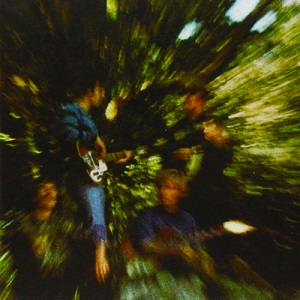
Bayou Country is the second studio album by American rock band Creedence Clearwater Revival, released by Fantasy Records on January 15, 1969, and was the first of three albums CCR released in that year. Bayou Country reached number 7 on Billboard's album chart and produced the band's first No. 2 hit single, "Proud Mary".
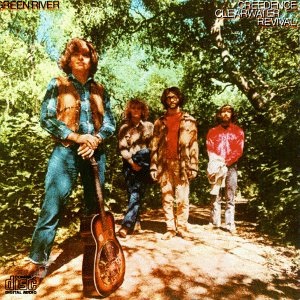
Green River is the third studio album by American rock band Creedence Clearwater Revival, released on August 7, 1969 by Fantasy Records. It was the second of three albums they released in that year, preceded by Bayou Country in January and followed by Willy and the Poor Boys in November.
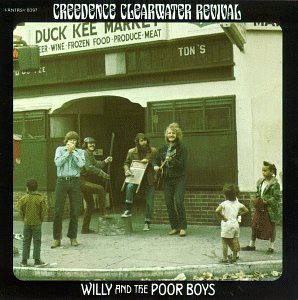
Willy and the Poor Boys is the fourth studio album by American rock band Creedence Clearwater Revival, released by Fantasy Records on October 29, 1969. It was the last of three studio albums the band released that year, arriving just three months after Green River. It was placed at number 193 in Rolling Stone's 2020 list of the "500 Greatest Albums of All Time".
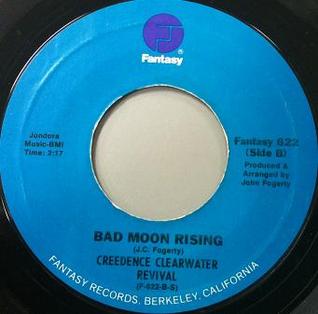
"Bad Moon Rising" is a song written by John Fogerty and performed by Creedence Clearwater Revival. It was the lead single from their album Green River and was released in April 16, 1969 four months before the album. The song peaked at No. 2 on the Billboard Hot 100 chart on 28 June 1969 and reached No. 1 on the UK Singles Chart for three weeks in September of that year. It was CCR's second gold single.
"Born on the Bayou" (1969) is the first track on Creedence Clearwater Revival's second album, Bayou Country, released in 1969. It was released as the B-side of the single "Proud Mary" that reached No. 2 on the Billboard charts.

"Proud Mary" is a song by American rock band Creedence Clearwater Revival, written by vocalist and lead guitarist John Fogerty. It was released as a single in January 1969 by Fantasy Records and on the band's second studio album, Bayou Country. The song became a major hit in the United States, peaking at No. 2 on the Billboard Hot 100 in March 1969, the first of five singles to peak at No. 2 for the group.

"Travelin' Band" is a song written by John Fogerty and originally recorded by Creedence Clearwater Revival. It was included on their 1970 album Cosmo's Factory. Backed with "Who'll Stop the Rain", it was one of three double sided singles from that album to reach the top five on the U.S. Pop Singles Chart and the first of two to reach the number 2 spot on the American charts, alongside "Lookin' Out My Back Door", in which they were unable to interrupt the six-week run of the successful number one, "Bridge Over Troubled Water" by Simon and Garfunkel. "Travelin' Band" was also a hit in the UK, reaching number eight on the UK Singles Chart.
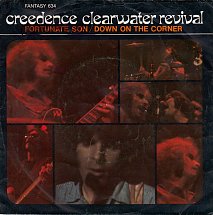
"Fortunate Son" is a song by the American rock band Creedence Clearwater Revival, released on their fourth studio album, Willy and the Poor Boys in October 1969. It was previously released as a single, together with "Down on the Corner", in September 1969. It soon became an anti-war movement anthem and an expressive symbol of the counterculture's opposition to U.S. military involvement in the Vietnam War and solidarity with the soldiers fighting it. The song has been featured extensively in pop culture depictions of the Vietnam War and the anti-war movement.

"Lookin' out My Back Door" is a song recorded by the American band Creedence Clearwater Revival. Written by the band's lead singer, guitarist and songwriter John Fogerty, it is included on their fifth album Cosmo's Factory (1970), and became their fifth and final number-two Billboard hit, held off the top by Diana Ross's version of "Ain't No Mountain High Enough". It was their only Cash Box Top 100 number-one hit.

"Up Around the Bend" is a song by American rock band Creedence Clearwater Revival, written by the band's frontman John Fogerty. It was composed and recorded only a few days prior to the band's April 1970 European tour and was included on the album Cosmo's Factory. Released as a single, with "Run Through the Jungle" on the flipside, the double-sided single climbed to number four on the Billboard Hot 100 chart in the spring of 1970.

"Have You Ever Seen the Rain" is a song by American rock band Creedence Clearwater Revival, written by John Fogerty and released as a single in 1971 from the album Pendulum (1970). The song charted highest in Canada, reaching number one on the RPM 100 national singles chart in March 1971. In the U.S., in the same year it peaked at number eight on the Billboard Hot 100 singles chart. On the Cash Box pop chart, it peaked at number three. In the UK, it reached number 36. It was the group's eighth gold-selling single. In March 2023, the song surpassed one billion streams on Spotify.
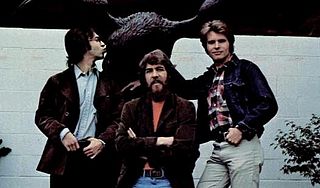
The discography of American rock band Creedence Clearwater Revival, who released their first album and singles in July 1968, includes 7 studio albums, 5 live albums, 41 compilation albums, and 29 singles. The group, although only active for 4 years, has sold more than 45 million albums and singles in the United States alone, and has charted in multiple countries throughout the world.
"Who'll Stop the Rain" is a song written by John Fogerty and originally recorded by Creedence Clearwater Revival for their 1970 album Cosmo's Factory. Backed with "Travelin' Band", it was one of three double-sided singles from that album to reach the top five on the Billboard Pop Singles chart and the first of two to reach the No. 2 spot on the American charts, alongside "Lookin' Out My Back Door"/"Long As I Can See the Light". In 2004, Rolling Stone ranked it No. 188 on its "500 Greatest Songs of All Time" list.
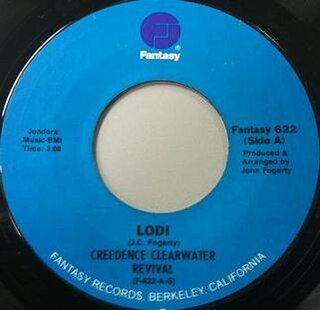
"Lodi" is a song written by John Fogerty and performed by Creedence Clearwater Revival. Recorded in March 1969, it was released in April, four months before the album, as the B-side of "Bad Moon Rising", the lead single from Green River.

"Long As I Can See the Light" is a song by American rock band Creedence Clearwater Revival, from the album Cosmo's Factory. Released as the flip side of the single "Lookin' Out My Back Door" in 1970, it reached number 57 on the Cash Box singles chart in the US, number 20 in the UK and number one in Norway.

"Sweet Hitch-Hiker" is a song by the American roots/swamp rock band Creedence Clearwater Revival from their 1972 album Mardi Gras. It was first released as a single in 1971 and reached #6 on the Billboard Hot 100, becoming their 9th and last top 10 hit. On the Record Retailer UK Singles Chart, it peaked at #36.
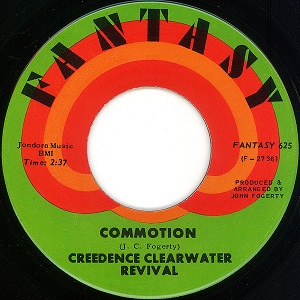
"Commotion" is a song by Creedence Clearwater Revival from the album Green River, and was also the B-side of the single release of the album's title track. In 1980, "Tombstone Shadow" b/w "Commotion'" was released as a single in the United States. While released as a B-side, "Commotion" reached #30 in the United States on the Billboard Hot 100 and #16 in Germany. It was written by John Fogerty and recorded at Wally Heider's Studios in San Francisco in June 1969. The 45rpm was the debut session of the band at Wally Heider's and the first collaboration with engineer Russ Gary.


















